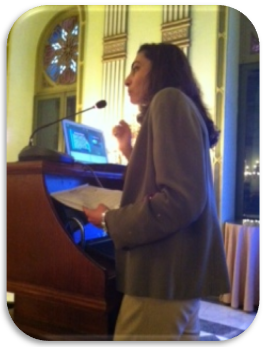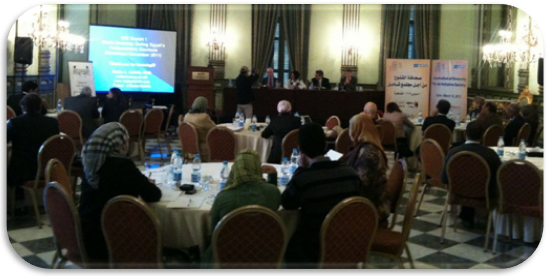
Published: 13 March 2012
Region: Egypt

By John Owen
“The title of the conference made me start laughing,” was how a leading Egyptian TV presenter, Reem Magued, recalled reacting when she was invited to speak at a conference entitled ‘Journalism of Diversity for an Inclusive Society’, organized by the Media Diversity Institute (MDI), in partnership with the British Council and UNESCO, and funded by SIDA, in Cairo on 10 March 2012.
Reem, who hosts a prime time current affairs programme on the heavily watched, highly regarded private television channel, ONTV, said that “… the state of diversity is such that instead of accepting one another’s differences, we tend to reject one another.”
And she acknowledged that even her own influential programme had failed to feature women in Egypt’s historic parliamentary elections in November and December 2011.
ONTV’s poor performance in relation to excluding women was matched – and exceeded – by other Egyptian television channels and newspapers. That finding was one of the highlights (or lowlights) of an MDI study on Egyptian media coverage of diversity during the November-December parliamentary election campaign, also released on 10 March 2012.
 According to Egyptian academic Dr. Rasha Abdulla, who coordinated the study, this was the first ever examination of diversity related to elections in Egypt.
According to Egyptian academic Dr. Rasha Abdulla, who coordinated the study, this was the first ever examination of diversity related to elections in Egypt.
Dr. Abdulla called the findings “staggering,” pointing out that over 93% of all those interviewed in newspapers were men. The analysis of media coverage in the study also highlighted a pattern of “marginalization” of others throughout the election campaign. Egypt’s Christian minority* was barely represented in newspaper coverage – under 1% – and also seldom seen on television news.
Speaking at the conference, former IFJ secretary general Aidan White, working with MDI to make the issue of diversity part of his new global “ethical journalism coalition,” said that the international community can be supportive but the remaking of Egyptian journalism had to be led by Egyptians, not outsiders.
One of those ready and willing to lead from inside Egypt is Hisham Kassem, also attending the conference. He has a proven record of shaking up Egyptian journalism. Al-Masry Al Youm (The Egyptian Today) newspaper, which he founded, staked out a role as a source of reporting and information independent of state-controlled media.
Now Kassem is investing all of his funds (and then some) to launch what could be the most innovative cross media platform channel in the Arab world. He is doing so at time when there is great political uncertainty in a post-Mubarak, Muslim Brotherhood-led Islamic oriented government. Potential investors in Kassem’s new channel may be sitting on their hands until they see whether the military will retire to the barracks after a new president is elected.
But Kassem is defiant that he will attract investors who share his vision and enable him to maintain both financial and editorial control of the channel, something he refuses to compromise on. He insists that he can be on the air and online in 6 months if he can secure additional money from Egyptian investors.
 At the MDI conference, MDI executive director Milica Pesic asked the panellists “why would they want to take on the diversity issue, knowing how much resistance there has been to championing those who are marginalized in Egypt?”
At the MDI conference, MDI executive director Milica Pesic asked the panellists “why would they want to take on the diversity issue, knowing how much resistance there has been to championing those who are marginalized in Egypt?”
Ayman El Sayyad, the editor-in-chief of Weghat Nazar, a monthly literary magazine, said that he and others working in media and journalism had to take on this issue “not because of profit but, because we will never solve our problems unless we have inclusion in Egyptian society.”
The conference was part of a two year MDI programme, ‘Embracing Free Expression, Diversity and Inclusiveness: Rebuilding post-revolution Egyptian media‘, funded by SIDA. The project also includes training for journalists and NGOs, support for journalism educators, production of TV entertainment programmes, and undertaking media monitoring studies. Its objective is to tackle the issues of political, social and cultural exclusion by state and privately own media in Egypt, and encourage the emergence of responsible Egyptian media based on international standards and principles of free expression, diversity, inclusiveness, transparency and public accountability.
*people with clearly Christian names or who were identified as Christians.
